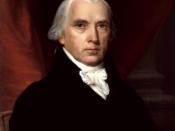James Madison's second inaugural speech was on March 4, 1813. Madison was a member of the Democratic-Republicans, but still held some views of the Federalist Party. The War of 1812, also known as Madison's War, with Britain began in Madison's first term and continued throughout his second. He had to deal with countless trading problems with France and Britain, the large split between Republicans and Federalists, and conflicts with Indians. Madison's second term was anything but peaceful.
The country at the time of Madison's inauguration was full of tension. Madison's Embargo Act of 1809, which cut of trade with France and Britain, was a watered down version of Jefferson's Embargo Act. It was due to expire in 1810, but instead of reinstating it; Congress dismantled it and set up the Macon Bill No. 2. This bill stated that whichever country, France or Britain, repealed its commercial restrictions on the US; the US would trade freely with them and place the embargo act back onto the non-repealing country.
Napoleon took advantage of this. Napoleon said that if Britain repealed its Order of Council that France would repeal its trading decrees. Napoleon had no intention of keeping this agreement. Madison did not trust Napoleon but agreed to it anyway hoping Britain would repeal its trading restriction if it saw the US trading exclusively with France. Britain did not back down. Madison was forced to place an embargo back on Britain. This lost neutrality for the US and was the final step towards the war.
America was also having problems with the Indians. Americans knew that the British were supplying the Indians with ammunition and weapons. There were constant attacks on the colonists, especially those in the trans-Allegheny wilderness. In 1811, General Harrison went into Tecumseh's, a Shawnee Indian who started...


